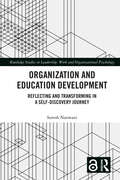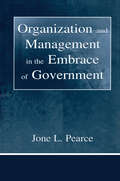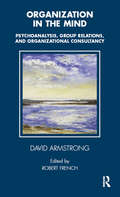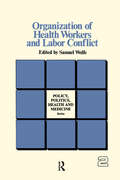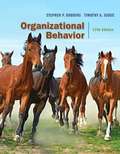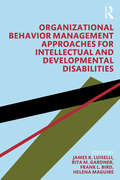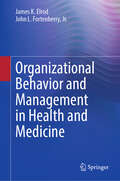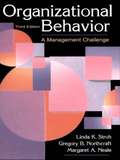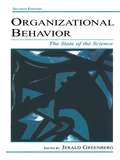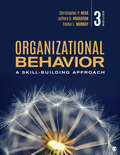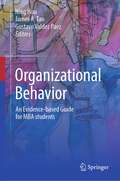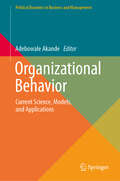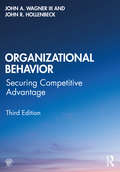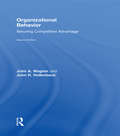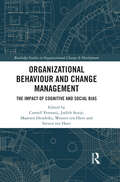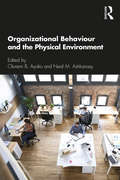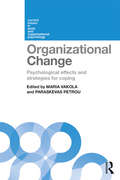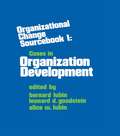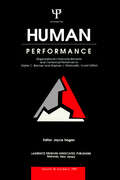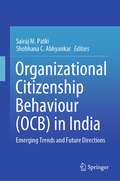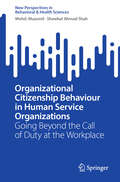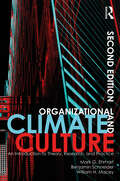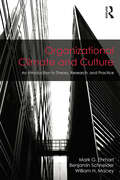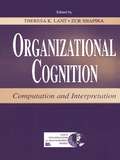- Table View
- List View
Organization and Education Development: Reflecting and Transforming in a Self-Discovery Journey (Routledge Studies in Leadership, Work and Organizational Psychology)
by Suresh NanwaniOrganization and Education Development combines reflective thinking and practice, action research living theory, and organization development to explore the self-discovery of meaning and purpose. It charts a journey undertaken by the author in pursuit of professional development through self-awareness and self-change as a fully integrated person and a better professor. This book is about an individual's integrative journey of self-discovery. The author’s narrative includes values and organizational development concepts and theories shared with fellow travelers, including supervisors, friends, and students. He shares invaluable insights and examples with the reader, using a model of a six-spoke wheel of final discovery and the MICAI intersection model. These integrative guides provide examples on how to search for what is best in everyday life and what gives us true meaning, encouraging personal reflection and ways of nurturing appreciation for our own lives. This multidisciplinary book combines western and eastern models and philosophies and draws from organization development, positive psychology, and education development. It will be ideal reading for students, researchers, and academics in the fields of organizational development, organizational psychology, social psychology, and education. It will appeal to any reader interested in learning about self-development.
Organization and Management in the Embrace of Government (Organization and Management Series)
by Jone PearceOrganization and Management in the Embrace of Government is an original exploration of how governments affect the ways people organize themselves, manage those organizations, and respond to the organizations thus created. It is a grounded theory of how governments that are weak, erratic, or hostile undermine complex organization, trust, meritocracy, commitment, and other implicit expectations about how organizations operate. Scholars, students, and all those interested in a better understanding of how governments affect our cultural expectations of one another, our organizations, and the economies based upon them will find this groundbreaking volume to be a rich resource. The author, President-Elect of the Academy of Management, distills original comparative data drawn from China, Hungary, the Czech Republic, Lithuania, and the United States to paint a coherent theory of the organizational effects of governments. The book has been written primarily to introduce organizational and governmental scholars to the ways that governments can influence organization and management. However, it also is written with an eye to readers with practical interests in international management or governments. This pioneering work will be discussed and analyzed for decades to come.
Organization in the Mind: Psychoanalysis, Group Relations and Organizational Consultancy (Tavistock Clinic Series)
by David ArmstrongDavid Armstrong has been a leading figure internationally in the fields of organizational consultancy and group relations for many years. Robert French and Russ Vince have gathered together, for the first time, his key writings in this area. This is essential reading for managers and leaders, as well as organizational consultants, academics and students of organizations. Part of the Tavistock Clinic Series.
Organization of Health Workers and Labor Conflict (Policy, Politics, Health and Medicine Series)
by Samuel WolfeOffers insights into such contemporary issues as health workers' unions, labor conflicts in health care facilities, and underlying class and class related sex and ethnic conflicts that beset the health sector.
Organizational Behavior (Seventeenth Edition)
by Stephen P. Robbins Timothy A. JudgeFor undergraduate and graduate courses in Organizational Behavior. Help Students Better Understand Their Behavioral and Interpersonal Skills Long considered the standard for all organizational behavior textbooks, Organizational Behavior provides the research you want, in the language you can understand. This text continues its tradition of making current, relevant research come alive for readers. The Seventeenth Edition has been thoroughly updated to reflect the most recent research and business events within the field of organizational behavior worldwide, while maintaining its hallmark features-clear writing style, cutting-edge content, and intuitive pedagogy. There's a reason why Robbins's textbooks have educated millions of individuals and have been translated into twenty languages-and it's because of a commitment that provides the kind of engaging, cutting-edge material that helps readers understand and connect with organizational behavior. Also Available with MyManagementLabTM MyManagementLab is an online homework, tutorial, and assessment program designed to work with this text to engage students and improve results. Within its structured environment, students practice what they learn, test their understanding, and pursue a personalized study plan that helps them better absorb course material and understand difficult concepts. NOTE: You are purchasing a standalone product; MyManagementLab does not come packaged with this content. If you would like to purchase both the physical text and MyManagementLab search for: 0134437861/ 9780134437866 Organizational Behavior Plus MyManagementLab with Pearson eText -- Access Card Package Package consists of: 013410398X / 9780134103983 Organizational Behavior 0134182189 / 9780134182186 MyManagementLab with Pearson eText--Access Card--for Organizational Behavior
Organizational Behavior Management Approaches for Intellectual and Developmental Disabilities
by James K. Luiselli, Rita M. Gardner, Frank L. Bird, and Helena MaguireComprised of chapters written by notable experts in the field, Organizational Behavior Management Approaches for Intellectual and Developmental Disabilities provides an up-to-date, comprehensive assessment of OBM-IDD. This edited volume not only provides an overview of the area of OBM-IDD, it also summarizes the extant literature, offers research-to-practice recommendations, and includes operational strategies for building successful service settings. Organizational Behavior Management Approaches for Intellectual and Developmental Disabilities synthesizes the published literature and directs practice and research in the areas of assessment and evaluation, training, supervision, and performance improvement, systems interventions, and organizational development. By providing the most contemporary and effective OBM practices derived from evidence-based research findings and recommendations from experienced scientist-practitioners, this book is an integral aid for professionals looking to improve different aspects of service delivery. The book is intended principally for professionals within educational, human services, and behavioral healthcare settings serving persons with IDD comprised of psychologists, educators, program administrators, organizational consultants, behavior analysts, and evaluation specialists. In particular, the book should appeal to practicing behavior analysts who hold the Behavior Analyst Certification Board (BACB) credential and are seeking professional development within OBM as well as academic instructors and researchers, graduate students, and trainees completing doctoral internships and post-doctoral fellowships.
Organizational Behavior and Management in Health and Medicine
by James K. Elrod John L. Fortenberry, Jr.This comprehensive textbook on healthcare organizational behavior and management uniquely bridges theory and practice, directing significant attention toward operationalization in health and medical settings. This blend of theory and practice differentiates the content of this book from that of related academic and professional books that tend to discuss theory at length with limited attention being directed toward practical applications. This approach ultimately affords readers with a working knowledge of the subject matter which must be mastered to successfully operate healthcare organizations and a real‐world skill set for use in practice. The contents of the text encompass a fairly broad spectrum of organizational behavior and management within the context of the healthcare industry and its associated organizations. Among the topics covered: Leadership in Health and Medicine Motivation in Health and Medicine Communication in Health and Medicine Strategy in Health and Medicine Ethics and Social Responsibility in Health and Medicine Organizational Culture in Health and Medicine Groups and Teams in Health and Medicine Power and Politics in Health and Medicine Beyond its efficient presentation of core facets of organizational behavior and management, the book features practical insights in each chapter from the authors' experiences as leaders at a health system. These passages share real-world insights, often involving unique applications, innovative thinking, and other creative perspectives from practice. These viewpoints are invaluable for helping readers to ground the theoretical overviews presented in each chapter, bolstering knowledge and understanding. A glossary of organizational behavior and management terminology is also included. Organizational Behavior and Management in Health and Medicine serves as a primer featuring principles and practices with intensive application and operational guidance. The text, with its learning objectives, chapter summaries, key terms, and exercises, is ideally suited for professors and students of health administration, medicine, nursing, and allied health. The book also can serve as a refresher for healthcare executives and managers (e.g., administrators, nurses, physicians) and as a useful reference for anyone with an interest in learning about administrative practices in health and medical settings.
Organizational Behavior: A Management Challenge
by Margaret A. Neale Linda K. Stroh Gregory B. Northcraft (Co-author) Mar Kern (Co-author) Chr LanglandsA true learning tool for students and scholars alike; the third edition of Organizational Behavior: A Management Challenge has been designed to effectively present an overview of the challenges facing managers and employees in today's competitive organizations. The latest research in organizational behavior has been interwoven with real-life cases and practical applications to provide a highly accessible text for advanced undergraduate and MBA students of management and psychology. To reflect the evolving challenges of today's organizations, this text contains expanded coverage of new technologies and global businesses and brings the sophisticated world into the classroom. A new chapter on Inclusion has also been added. New Features: *Research in Action Boxes--contributions from leading researchers in the field. *Focus On--vignettes and boxed items that emphasize technology issues and international issues. *On Your Own--experimental exercises that can be either completed individually or collaboratively. *The Manager's Memo--a unique format for end-of-chapter cases. Real-life management problems presented through a memo. Provides the opportunity for formal written responses, as well as class discussion. *Photos and NEW Artwork-- with captions that tie the relevancy of the graphics to the text concepts. Supplements: *Instructor's Manual *PowerPoint on CD--packaged automatically with the Instructor's Manual *Text Specific Web site: www.organizationalbehavior.ws **Special Copy for 4C mailer** Below the bios: These three leading scholars in their field have written the new Third Edition of Organizational Behavior to include coverage of technology in the workplace and the challenges of a global market. A NEW chapter on Inclusion (chapter 16) has also been added. The latest research in organizational behavior has been interwoven with real-life cases and practical applications to provide a highly accessible text for advanced undergraduate and MBA students of management and psychology. We at LEA invite you to examine our new exciting learning tool for students and scholars alike. Please preview the wonderful new features of Stroh, Northcraft and Neale's new textbook that will help the reader gain the knowledge to succeed in today's changing work environments. Supplements INSTRUCTOR WEB RESOURCE - www.organizationalbehavior.ws Prepared by Christine L. Langlands, this FREE, text-specific website includes the entire Instructor's Resource Manual, all of the PowerPoint slides described below, the Preface and Table of Contents for the textbook, author biographies and ordering information to obtain a copy of the text. This valuable on-line resource is designed to be completely intuitive and enhances both the live contact course and the virtual classroom. To keep pace with the evolving field of Organizational Behavior, the website will be updated by the author team over the life of the text. INSTRUCTOR'S MANUAL Written by Mary C. Freeman-Kerns and Christine L. Langlands, in conjunction with the authors of the textbook, this IM was created in the classroom. This rich resource contains detailed chapter outlines, the answers to the questions in the textbook, and additional case or group exercises for each section of the text. Available directly on the website OR in hardcopy (upon adoption), this IM is a tool that will guide new instructors smoothly through their course. POWERPOINT CD-ROM Containing more than 250 PowerPoint slides, this dual-platform CD-ROM enhances any lecture with interesting and accurate visuals. The CD-ROM will be packaged FREE with the hardcopy Instructor's Manual. Third Edition Features Research in Action Contributions from leading researchers in the field highlight the connec
Organizational Behavior: A Management Challenge (Lea's Organization And Management Ser.)
by Margaret A. Neale Linda K. Stroh Gregory B. Northcraft (Co-author) Mar Kern (Co-author) Chr LanglandsThis second edition is a revision of a successful reader in organizational behavior, edited by Jerald Greenberg. This volume describes the latest advances in the field of organizational behavior. Each chapter is a description of "what was," "what is," and "what will be" as envisioned by leading researchers and experts. Topics covered include: affect, stress, self-fulfilling prophecies, diversity, justice, reputations, deviant behavior, conflict, construct validity, and cross-cultural behavior. The book concludes with a commentary chapter by Ed Locke--a distinguished senior scholar--who offers directions and guidance on the field's future. This book will appeal to professors and scholars in industrial-organizational psychology, organizational behavior, human resource management, and social psychology. It is an invaluable compendium reporting on the state of the science in a rapidly developing field.
Organizational Behavior: A Skill-Building Approach
by Emma L. Murray Christopher P. Neck Jeffery D. HoughtonOrganizational Behavior: A Skill-Building Approach, Third Edition examines how individual characteristics, group dynamics, and organizational factors affect performance, motivation, and job satisfaction, providing students with a holistic understanding of OB. Translating the latest research into practical applications and best practices, authors Christopher P. Neck, Jeffery D. Houghton, and Emma Murray unpack how managers can develop their managerial skills to unleash the potential of their employees. This title is accompanied by a complete teaching and learning package. Contact your SAGE representative to request a demo. Learning Platform / Courseware SAGE Vantage is an intuitive learning platform that integrates quality SAGE textbook content with assignable multimedia activities and auto-graded assessments to drive student engagement and ensure accountability. Unparalleled in its ease of use and built for dynamic teaching and learning, Vantage offers customizable LMS integration and best-in-class support. It′s a learning platform you, and your students, will actually love. Learn more. Assignable Video with Assessment Assignable video (available in SAGE Vantage) is tied to learning objectives and curated exclusively for this text to bring concepts to life. Watch a sample video now. LMS Cartridge: Import this title′s instructor resources into your school′s learning management system (LMS) and save time. Don′t use an LMS? You can still access all of the same online resources for this title via the password-protected Instructor Resource Site. Learn more.
Organizational Behavior: A Skill-Building Approach
by Emma L. Murray Christopher P. Neck Jeffery D. HoughtonOrganizational Behavior: A Skill-Building Approach, Third Edition examines how individual characteristics, group dynamics, and organizational factors affect performance, motivation, and job satisfaction, providing students with a holistic understanding of OB. Translating the latest research into practical applications and best practices, authors Christopher P. Neck, Jeffery D. Houghton, and Emma Murray unpack how managers can develop their managerial skills to unleash the potential of their employees. This title is accompanied by a complete teaching and learning package. Contact your SAGE representative to request a demo. Learning Platform / Courseware SAGE Vantage is an intuitive learning platform that integrates quality SAGE textbook content with assignable multimedia activities and auto-graded assessments to drive student engagement and ensure accountability. Unparalleled in its ease of use and built for dynamic teaching and learning, Vantage offers customizable LMS integration and best-in-class support. It′s a learning platform you, and your students, will actually love. Learn more. Assignable Video with Assessment Assignable video (available in SAGE Vantage) is tied to learning objectives and curated exclusively for this text to bring concepts to life. Watch a sample video now. LMS Cartridge: Import this title′s instructor resources into your school′s learning management system (LMS) and save time. Don′t use an LMS? You can still access all of the same online resources for this title via the password-protected Instructor Resource Site. Learn more.
Organizational Behavior: An evidence-based guide for MBA students
by Ning Hou James A. Tan Gustavo Valdez PaezThis book provides guidelines that students and professionals can relate to, pointing to relevant cases and methods. At the MBA Level, students have proven interested and seek further exploration of the concepts learned through college and their personal experiences in the field. As organizations become more diverse, there is a need to discuss and reference updated academic research on all seven major OB topics: Individual differences, motivation, teams, decision making, communication and conflict, leadership, and organizational processes. The book incorporates the post-pandemic perspectives on each topic. Example topics include personal value changes (chapter 2), challenges in motivation (chapter 3), virtual teams (chapter 4), decision making behavior forces during pandemic (chapter 5), zoom communication fatigue (chapter 6), leading in time of crises (chapter 7), and organizational change (chapter 8). This MBA guidebook will help students navigate the rapidly changing work landscape by tapping into some of the fundamental aspects of human behavior, allowing them to approach diverse human interactions from a more personal perspective.
Organizational Behavior: Current Science, Models, and Applications (Political Dynamics in Business and Management)
by Adebowale AkandeThis volume presents the complex dynamics of organizational behavior. It sheds light on the interplay between working relationships, leadership, management, and political influence, offering fresh insights into how these elements shape organizational culture and performance. Leaders and managers will gain valuable strategies for navigating power structures and interpersonal relationships, while employees will find guidance on advancing their careers through strategic political awareness. Topics such as group behavior, diversity and inclusion, cultural and emotional intelligence, and ethical decision-making are thoroughly examined. Each chapter is designed for clarity and emphasizes practical application. By doing so, the volume equips readers with the skills to implement effective strategies in the workplace. The book further provides a better understanding of organizational behavior and enables readers to drive positive change in the workplace. By blending theory with actionable insights, the book will appeal to students, academics, and professionals alike, interested in learning how to address real-world challenges.
Organizational Behavior: Securing Competitive Advantage
by John A. Wagner III John R HollenbeckThe management of organizational behavior is a critically important source of competitive advantage in today’s organizations. Managers must be able to capitalize on employees’ individual differences as jobs are designed, teams are formed, work is structured, and change is facilitated. This textbook, now in its third edition, provides its readers with the knowledge required to succeed as managers under these circumstances. In this book, John Wagner and John Hollenbeck make the key connection between theory and practice to help students excel as managers charged with the task of securing competitive advantage. They present students with a variety of helpful learning tools, including: • Coverage of the full spectrum of organizational behavior topics • Managerial models that are based in many instances on hundreds of research studies and decades of management practice – not the latest fad • Completely new introductory mini-cases and updated examples throughout the text to help students contextualize organizational behavior theory and understand its application in today’s business world This ideal book for upper-level undergraduate and postgraduate students of organizational behavior is written to motivate exceptional student performance and contribute to their lasting managerial success. Online resources, including PowerPoint slides and test banks, round out this essential resource for instructors and students of organizational behavior.
Organizational Behavior: Securing Competitive Advantage (Management Ser.)
by John A. Wagner III John R. HollenbeckThe management of organizational behavior is a critically important source of competitive advantage in today's organizations. Every organization's members share a constellation of skills, abilities, and motivations that differentiates it from every other firm. To gain advantage, managers must be able to capitalize on these individual differences as jobs are designed, teams are formed, work is structured, and change is facilitated. This textbook, now in its second edition, provides its readers with the knowledge required to succeed as managers under these circumstances. In this book, John Wagner and John Hollenbeck make the key connection between theory and practice to help students excel as managers charged with the task of securing competitive advantage. They present students with a variety of helpful learning tools, including: Coverage of the full spectrum of organizational behavior topics Managerial models that are based in many instances on hundreds of research studies and decades of management practice Introductory mini-cases and current examples throughout the the text to help students contextualize organizational behavior theory and understand its application in today's business world The ideal book for undergraduate and graduate students of organizational behavior, Organizational Behavior: Securing Competitive Advantage is written to motivate exceptional student performance and contribute to their lasting managerial success.
Organizational Behaviour and Change Management: The Impact of Cognitive and Social Bias (Routledge Studies in Organizational Change & Development)
by Steven ten Have Wouter ten Have Cornell Vernooij Judith Stuijt Maarten HendriksPeople are social animals and change is a social process. To understand this social process and explain the thoughts, feelings and behaviours of individuals, knowledge of how people are influenced by the presence of others is crucial. In this regard, bias, is a concept with a lot of potential. Cognitive and social biases, by influencing human thinking, feelings, and behaviour, provide insights and knowledge that are helpful, if not essential for the field of organisational behaviour and change management. The statements stated above may seem obvious and self-evident, but practice as well as science, show that it is not. Organizational Behaviour and Change Management: The Impact of Cognitive and Social Bias aims at unleashing the potential of cognitive and social biases to develop a more effective change management theory and practice. To do so thousands of scientific articles were analysed and assessed. The most prominent biases are structured by using a practical and comprehensible framework based on five core social motives (belonging, understanding, controlling, trusting and self-enhancing). With its evidence-based, systematic and integrative approach, this book provides scientists and practitioners in the field of organisational behaviour and change management with the best available evidence, linking biases to organisational behaviour and change and thereby further enriching the field of change management.
Organizational Behaviour and the Physical Environment
by Neal M. Ashkanasy Oluremi B. AyokoThis book looks at how the physical environment of work shapes organizational behaviour, demonstrating that our physical surroundings at work can have a big influence on employee productivity, performance and wellbeing. Drawing upon the latest research, Organizational Behaviour and the Physical Environment provides comprehensive coverage of the different aspects of the physical environment at work – the buildings, furnishings, equipment, lighting, air quality and their configurations. From theories of psychological ownership and work design, to cultural issues and technology in the workplace, its international range of contributors provide voices from Australasia, North America, Europe and the Middle East. This book will be invaluable supplementary reading for advanced students, researchers and practitioners across the fields of organizational behaviour, HRM, organizational and environmental psychology, and workspace design.
Organizational Change: Psychological effects and strategies for coping
by Maria Vakola Paraskevas PetrouOrganizational change is a reality of 21st-century working life, but what psychological effects does it have on individual workers, and what coping strategies can be used to mediate its impact? In today’s turbulent work and career environment, employees are required not only to accept changes as passive recipients, but to proactively initiate changes and demonstrate attitudes, behaviours and skills valued by current employers. As a result, organizational psychologists, both researchers and practitioners, have had to acknowledge and understand the myriad of challenges faced by employees as a result of organizational change. In this important new book, an international range of prominent scholars examine the key psychological issues around organizational change at the individual level, including: health and well-being stress and emotional regulation performance and leadership attitudes and implications for the psychological contract Analyzing and presenting the impact of organizational change, and possible coping strategies to successfully manage change, the volume is ideal for students and researchers of work and organizational psychology, business and management and HRM.
Organizational Change: Sourcebook I: Cases in Organizational Development
by Bernard Lubin, Leonard D. Goodstein and Alice W. LubinFirst published in 1984. Routledge is an imprint of Taylor & Francis, an informa company.
Organizational Citizenship Behavior and Contextual Performance: A Special Issue of Human Performance
by Walter C. Borman Stephan J. MotowidloThese articles describe ideas about contextual performance, organizational citizenship behavior (OCB), and similar patterns of behavior that have been developed by scholars working from very different research traditions. It seems that the different research traditions are converging on the same notion--that besides formal job requirements, other patterns of behavior are also critical for organizational effectiveness and survival. These other patterns of behavior have been relatively ignored until recently, but now scholars are trying to define them, determine exactly why and how they are important for organizations, and identify their antecedents. The results of these research efforts-- described by articles in this issue--will help to make it possible to develop new conceptual and practical tools for managing these important behaviors and in that way promote human performance and organizational effectiveness.
Organizational Citizenship Behaviour (OCB) in India: Emerging Trends and Future Directions
by Sairaj M. Patki Shobhana C. AbhyankarThis book presents an exploration of Organizational Citizenship Behaviour (OCB), a concept with a long-standing history. It offers contemporary studies and discusses possible future directions for workplaces. The diverse range of topics this book covers makes it an engaging resource for anyone interested in OCB. The section on the pandemic covers citizenship acts performed by Indian organizations, OCB among teachers, and its significant work-related correlates in post-pandemic India. The second section covers contemporary correlates of OCB, such as work-life balance, compliance, counter-productive workplace behaviours (CWBs), and employee expectations. The future workplaces section discusses challenges to OCB, the measurement of OCB in evolving work environments, the role of machine learning (ML) in recruitment, and the importance of diversity management in ensuring OCB in inclusive workplaces. The book makes a valuable source of relevant issues on OCB while providing a broader perspective on future possibilities. It serves as reference material for students and researchers in fields like organizational behaviour, human resource management and development, and industrial psychology to study contemporary issues in OCB. The book also serves as a handy guide for managers looking to harness the benefits of citizenship behaviours to give their organizations an edge over competitors in the near future.
Organizational Citizenship Behaviour in Human Service Organizations: Going Beyond the Call of Duty at the Workplace (New Perspectives in Behavioral & Health Sciences)
by Mohd. Muzamil Shawkat Ahmad ShahThis book is about organizational citizenship behaviour in human service organizations. Organizational citizenship behavior is a relatively new construct that has generated interest not only among the researchers but also policy makers, and it is considered to be a strong predictor of organizational effectiveness. One of the main objectives of this book is to explain organizational citizenship behaviour from a psychometric viewpoint, in context of human service organizations. Considering the recommendations put forth by various authors of books written on organizational citizenship behaviour, there is an urgent need for a book that explains organizational citizenship behaviour from the perspective of human service organizations. It is hoped that the book will serve as a foundational resource for researchers working for the welfare of human service organizations, especially those functioning in the Asian region.
Organizational Climate and Culture: An Introduction to Theory, Research, and Practice
by Mark G. Ehrhart Benjamin Schneider William H. MaceyOrganizational Climate and Culture breaks down the barriers between the fields of organizational climate and organizational culture to encourage a broader understanding of how an organization’s environment affects its functioning and performance.Building on in-depth reviews of the development of both the organizational climate and organizational culture literatures, the book identifies key research issues as well as how practitioners can utilize the key concepts when conducting organizational cultural inquiries and leading change efforts. The book identifies the key strengths and limitations of research and theory on each topic and then presents ways each field could learn from the other. The authors also identify how practitioners can leverage the key concepts in the two literatures when conducting organizational cultural inquiries leading to climate and culture change efforts. The end product is an in-depth discussion and reconciliation of organizational climate and culture unlike anything that has come before it.In this updated edition, Mark G. Ehrhart, Benjamin Schneider and William H. Macey present a thorough examination of both the history and current status of research in each field, as well as areas for their potential integration. Academics, practitioners, and students will all deepen their understanding of how organizations function and will gain insights into how to improve both organizational research and organizational effectiveness.
Organizational Climate and Culture: An Introduction to Theory, Research, and Practice (Organization and Management Series)
by William H. Macey Benjamin Schneider Mark G. EhrhartThe fields of organizational climate and organizational culture have co-existed for several decades with very little integration between the two. In Organizational Climate and Culture: An Introduction to Theory, Research, and Practice, Mark G. Ehrhart, Benjamin Schneider, and William H. Macey break down the barriers between these fields to encourage a broader understanding of how an organization’s environment affects its functioning and performance. Building on in-depth reviews of the development of both the organizational climate and organizational culture literatures, the authors identify the key issues that researchers in each field could learn from the other and provide recommendations for the integration of the two. They also identify how practitioners can utilize the key concepts in the two literatures when conducting organizational cultural inquiries and leading change efforts. The end product is an in-depth discussion of organizational climate and culture unlike anything that has come before that provides unique insights for a broad audience of academics, practitioners, and students.
Organizational Cognition: Computation and Interpretation (Organization and Management Series)
by Zur Shapira Theresa K. LantOrganizational Cognition is a collection of chapters written by scholars from around the world. The editors outline the history of two approaches to the study of cognition in organizations, the computational approach and the interpretive approach. The chapters represent some of the most cutting-edge research on organizational cognition, covering research that spans many levels of analysis. Much of the work in the book demonstrates how computational and interpretive approaches can be combined in a way that provides greater insight into cognitive processes in and among organizations. The editors conclude by elaborating the likely boundary conditions of each approach and how they can be combined for a more complete understanding of cognition in organizations.
